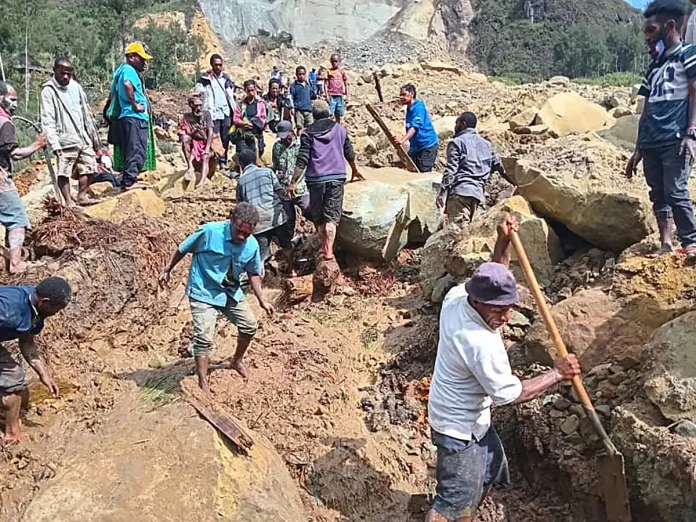As many as 2,000 people are feared to have been buried by a massive landslide in Papua New Guinea, according to the country’s National Disaster Centre, as survivors recounted the horror of losing so many loved ones.
The landslide occurred in the mountainous Enga region in northern Papua New Guinea on Friday and the latest missing figure is a sharp rise from earlier estimates.
Locals have been left reeling after tonnes of rock and mud smashed into their homes as they slept. Rescuers have struggled to reach such a remote part of what is already one of Asia’s poorest nations, leaving locals with little choice but to dig through the collapsed mountainside with whatever tools they have.
The figure, provided by the acting director of the country’s National Disaster Centre, is far higher than the 670 the United Nations (UN) suggested over the weekend.
Exact casualty figures for the disaster, which tore through the village in the early hours of Friday, have been difficult to establish.
Desperate attempts to rescue survivors or remove bodies from the rubble have so far been hindered by rubble 10 m (32 ft) deep in some places, blocked access and a lack of adequate equipment.
But on the ground, hopes are fading for the mountain residents swept up in the disaster.
Local media reported one couple being pulled alive from under rocks. They had survived, as their home only caught the edge of the landslide’s onslaught.
They were saved after rescue workers heard their shouts for help,
Crews at the scene also say rescue efforts are being hindered by major damage to the sole road leading to the town.
Local officials and reporters have attributed the mountain’s collapse to weeks of heavy rain and other wet conditions in the area.
The landslide hit the remote village of Kaokalam, about 600 kilometers (372 miles) northwest of the capital Port Moresby, on Friday, leaving a scar of debris that humanitarian workers said was as big as four football pitches.
More than 150 houses in Yambali village were buried in debris, officials said on Sunday.
Papua New Guinea is home to around 10 million people. Its vast mountainous terrain and lack of roads have made it difficult to access the affected area.













